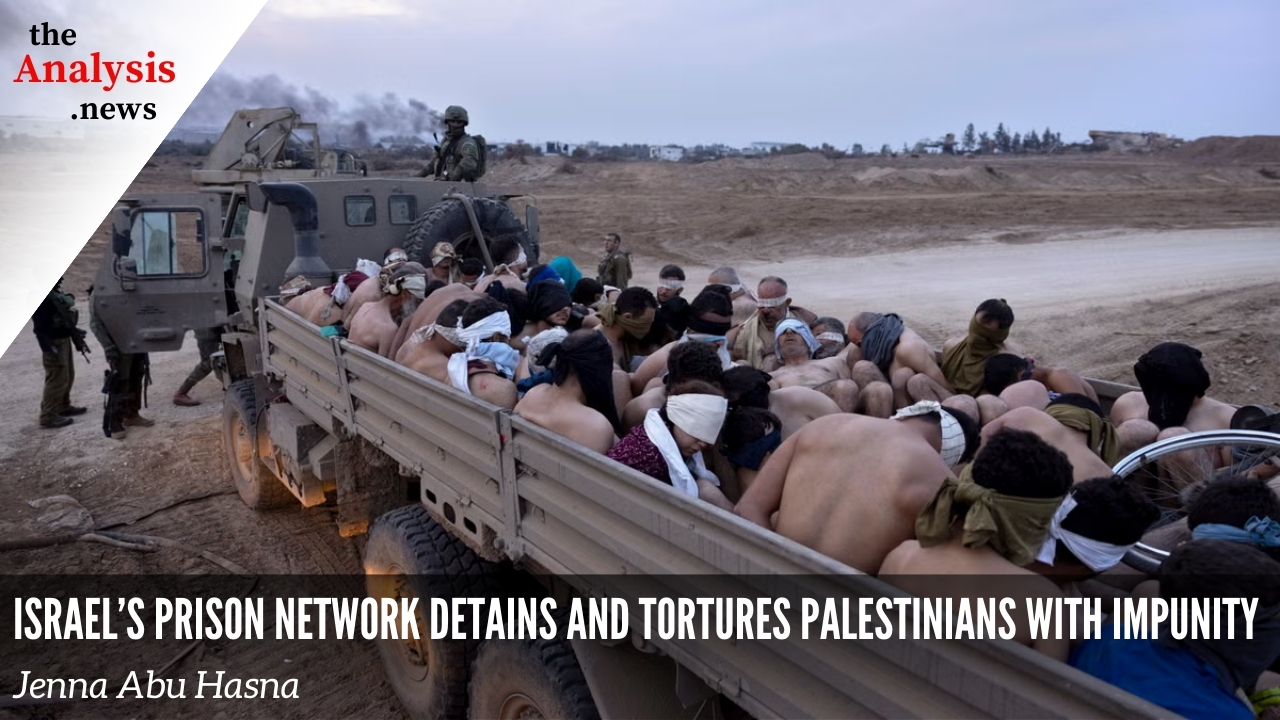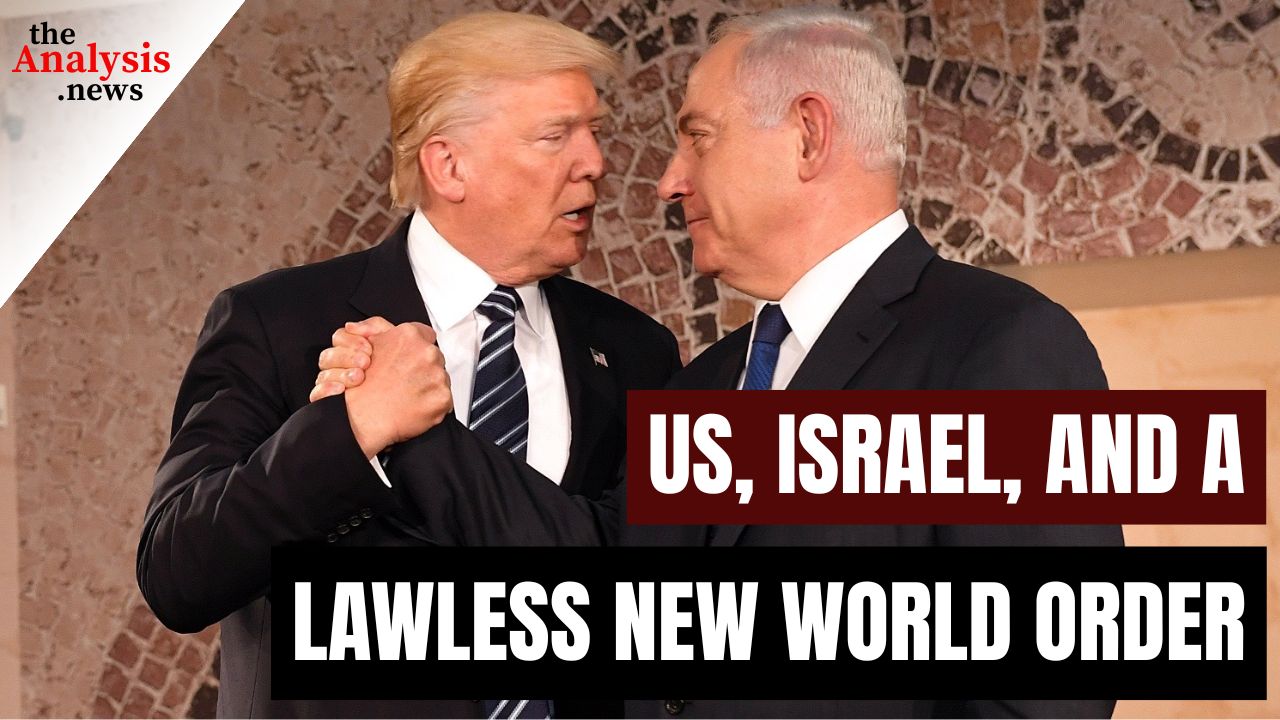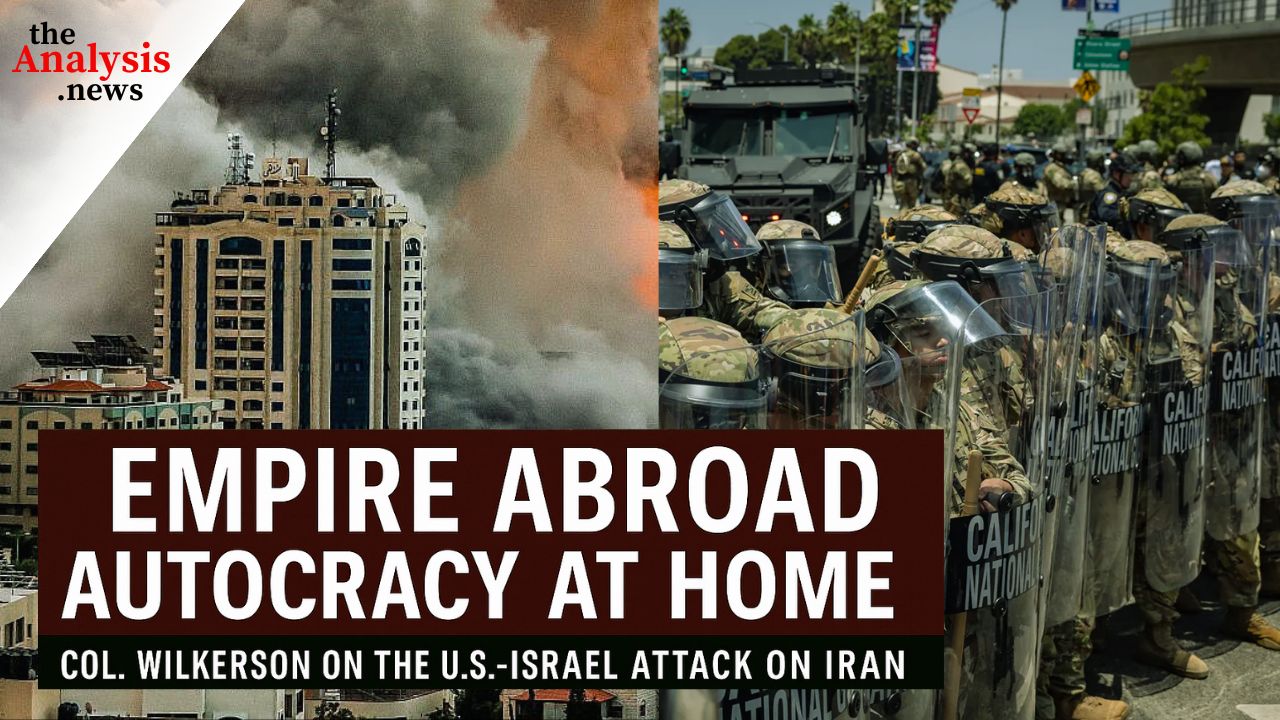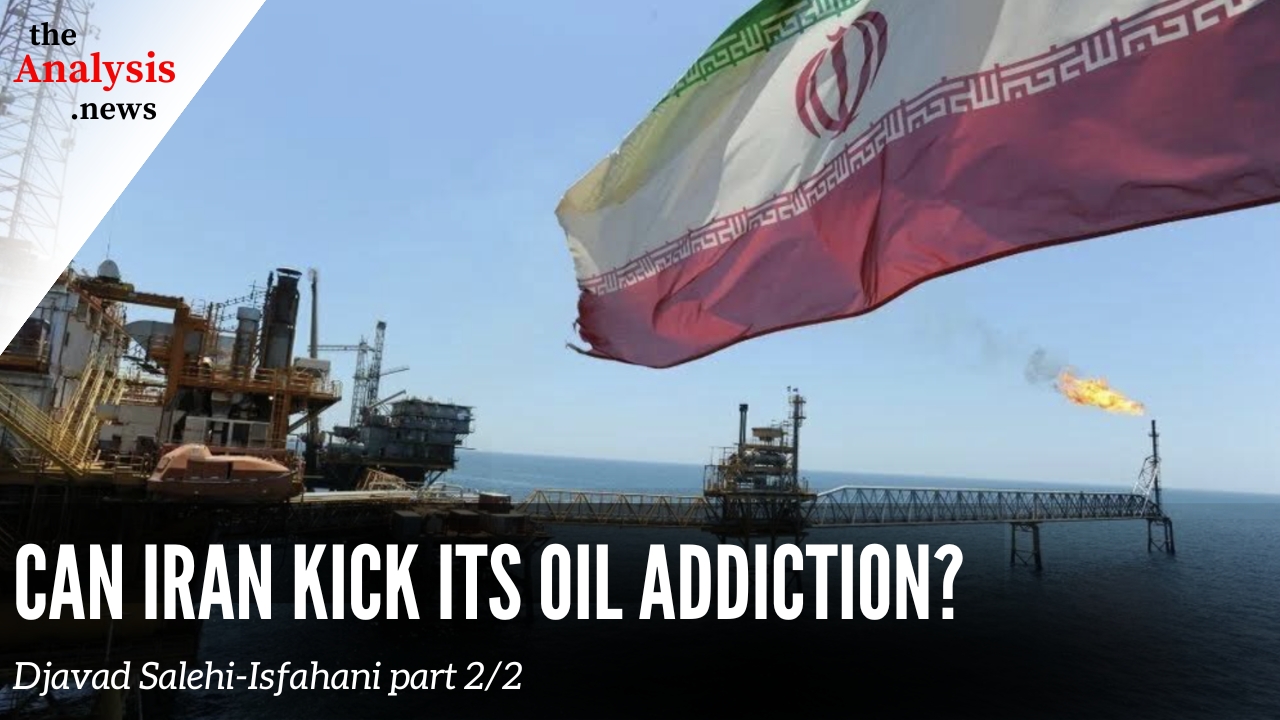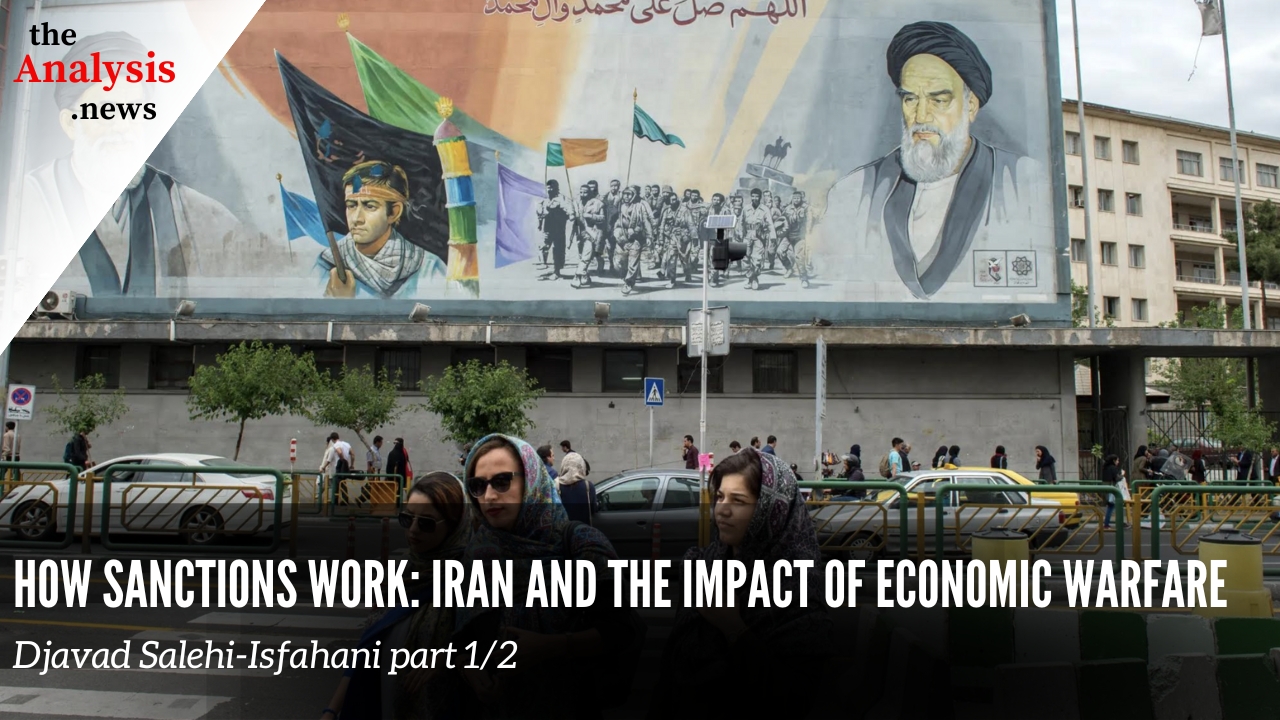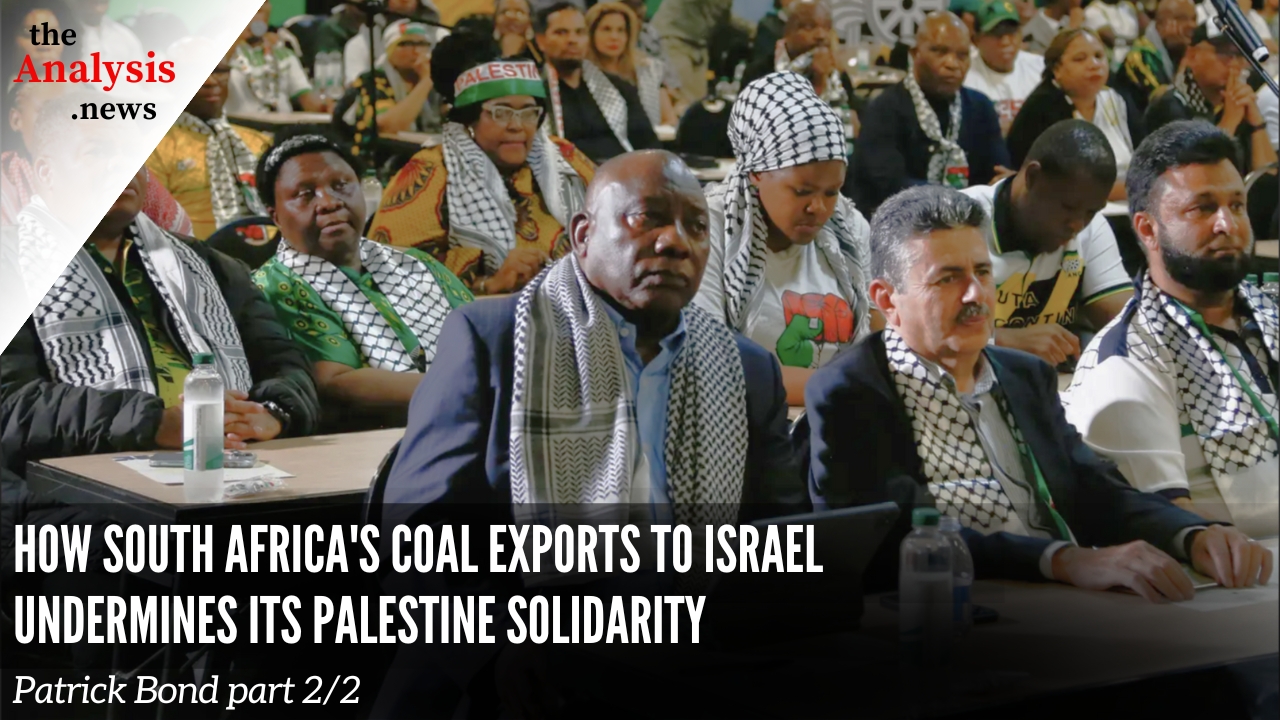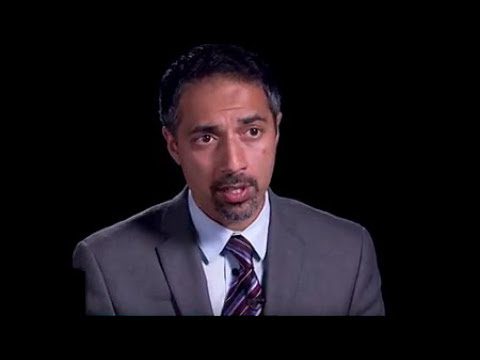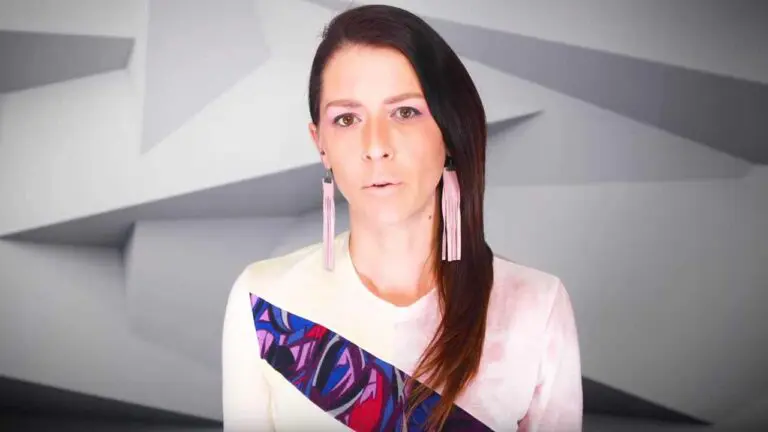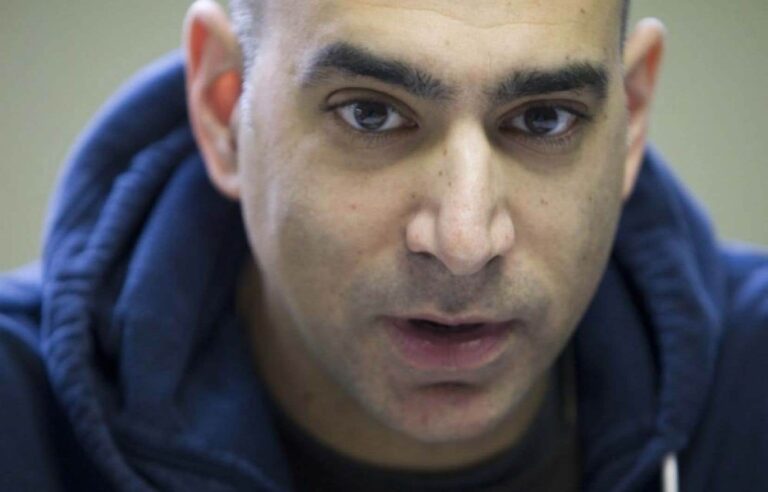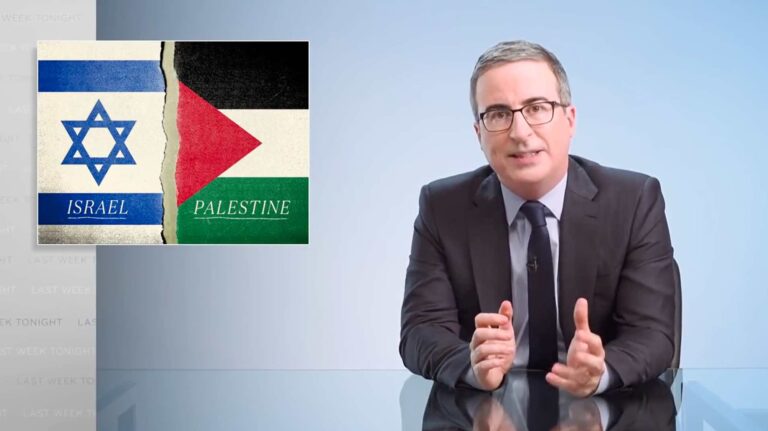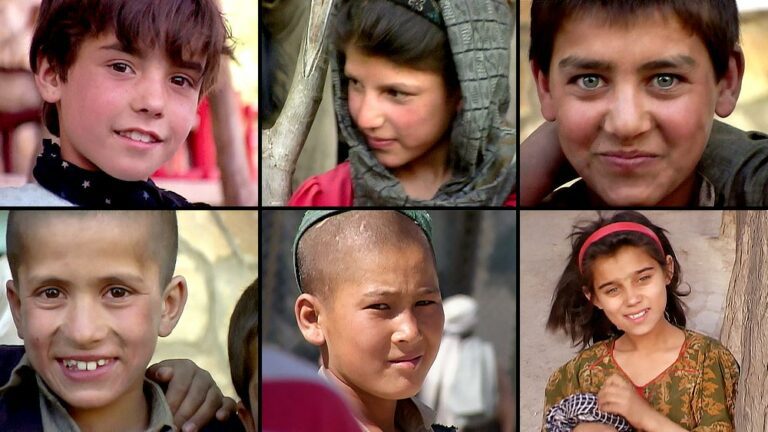Israeli military raids on the West Bank have intensified ever since the fragile ceasefire agreement came into effect in Gaza. According to the Palestinian Health Ministry, Israeli forces have killed over 70 Palestinians in the West Bank this year alone and displaced thousands from their homes. These IDF raids not only target and kill Palestinians of all ages but serve as a pretext to launch mass arrest campaigns. Jenna Abu Hasna, international advocacy officer at the Ramallah-based NGO Addameer, describes Israel’s longstanding practice of mass arrests in the occupied Palestinian territories. Abu Hasna outlines Israel’s systemic torture of Palestinians in Israeli jails and its widespread practice of placing Palestinians under administrative detention for months – even years – without filing formal charges. Israel’s system of mass incarceration is not only a violation of international norms but serves as a tool to dispossess Palestinians of their rights, dignity, and land.
Talia Baroncelli
Hi, I’m Talia Baroncelli, and you’re watching theAnalysis.news. Today, I’ll be speaking to Jenna Abu Hasna from the organization Addameer, and we’ll be discussing the detainment of Palestinian prisoners and the inhumane treatment that many of them are subjected to in Israeli prisons.
If you’d like to support the work that we do, you can go to our website, theAnalysis.news hit the donate button at the top right corner of the screen. Most importantly, get onto our mailing list; that way, all of our new content can get sent straight to your inbox. You can like and subscribe to our YouTube channel and hit the bell to get all of our notifications or listen to us on podcast streaming services such as Apple or Spotify. See you in a bit with Jenna.
I’m very happy to be joined by Jenna Abu Hasna. She is the International Advocacy Officer for the NGO at Addameer, which is based in Ramallah in the West Bank, and Addameer advocates for the rights of Palestinian prisoners. Thank you so much for joining me today, Jenna.
Jenna Abu Hasna
Thank you, Talia. Thank you for having me.
Talia Baroncelli
Well, Jenna, it’s really great to have you to discuss this incredibly important issue of Israel’s mass incarceration and detention of Palestinians, both in the occupied territories and throughout Israel. This is really an issue that’s not given as much attention as it deserves, the issue of the administrative detention of Palestinians and how Israel uses incarceration and imprisonment as a tool to further the occupation. But before we get into that, could you explain the work that your organization, Addameer, does for Palestinian prisoners?
Jenna Abu Hasna
Addameer is a nonprofit organization. We work towards providing free legal aid to Palestinian detainees who are detained by the occupation. We represent them in military courts, and we also are able to collect testimonies from lawyers who are able to visit the detainees in the occupation’s prisons.
In these testimonies, the detainees speak about their conditions and the violations that are being committed against them. We use this for many different reasons or many different uses, such as when it comes to international level submissions that could be sent to many different international areas, such as the UN, to the UN special rapporteur, or also to international courts as well, because it’s very important to get out the narrative of the Palestinian detainees that are detained under the occupation due to the mass torture that is going on within the prisons and the other human rights violations that is being committed against the detainees. Also, using the testimonies and collecting the testimonies from the detainees who would speak about these conditions allows us to carry out our advocacy work in which we bring to light the situation of the detainees because, as you said, the issue of Palestinian detainees is not really spoken about much in the international community because a lot of the focus is on how the occupation directly targets Palestinians by just direct targeting of killings and other brutal violations that they carry out during many different raids on homes and villages.
However, during all of these raids, there are also mass arrest campaigns that occur in which the occupation detains a number of Palestinians every single day. The numbers of detainees change almost every single day due to the mass arrest campaigns that the occupation has been carrying out since its establishment of the occupying state, especially after October 7 of 2023, with the escalation of arrests and the violence that is committed during these arrests.
Talia Baroncelli
Could you give us a sense of how widespread these arrests are? I know ever since October 7, 2023, the Israeli military has engaged in numerous mass arrest campaigns, and over 10,000 Palestinians were arrested. I don’t think all of them were actually kept in prison, but many of them were. Thousands of them, I think over 5,000 at least. Could you give us a sense of the scale of this and also what sort of people are being detained in these mass arrests?
Jenna Abu Hasna
Actually, before October 7, the numbers of the total amount of detainees that we had was almost 5,000. Then, from those 5,000, we had a little bit over 1,000 administrative detainees. However, after October 7, due to the arrest campaigns that were being carried out by the occupation in almost every single city in the occupied territories, the numbers reached 10,400 detainees. We actually did have a total of 10,400 detainees before the first batch of prisoner exchange deals that had occurred on January 19, this year, 2025. We had a total number of 10,400 detainees. From those 10,400, we had almost 4,000 under administrative detention. The numbers have almost tripled from going to 5,000 before October 7 to almost 11,000 as of this year. Since October 7, we have been speaking about almost 13,000 or more Palestinians who have been subjected to arrests. From those 13,000, as you said, not all of them have been completely placed in detention but were taken for interrogation on sites in the field, and then also interrogation in the prisons, and then later on released. But yeah, that is the number that we were speaking about before the first exchange deal on the 19 of January. It was almost 10,400. Each prisoner has a different legal background and reasons between quotations as to why the occupation decided to target them and detain them.
As you said, there are almost 4,000 under administrative detention. As you mentioned, administrative detention is an order that allows the occupation to detain any Palestinian, no matter their age or gender, based on no charge or evidence against them. The occupation claimed that there was evidence they had against this detainee that proved that they were a threat to the security of the nation of the occupying state. However, we have children as young as 14 years old who are detained under administrative detention. You have elderly people as well who are under administrative detention, and they can be detained. They can be ordered for 3-6 months, and then this order is renewable indefinitely. This order is renewed on a file that the lawyer and the detainee have absolutely no access to. Only the Israeli judge and prosecutor in these unjust military courts have access to this secret file that they claim to have. Ultimately, it just means that we have thousands of Palestinians that are detained by the occupation for absolutely no reason.
Then we also have detainees that are being detained for different reasons, such as the occupation claiming incitement of violence. Any form of resistance that is carried out by a Palestinian, which is ultimately just their right to self-determination, is seen as a violent resistance by the occupation. Attending a peaceful protest, also sharing anything on social media, liking a post on social media, and bringing awareness around the violations that are being committed in Palestine can lead to the occupation stating that you’re inciting violence, and for that, you’re going to be detained for months or even sometimes years. Each case is different. Due to the military courts being built on a lot of violations of international law and basically just unfair trial guarantees, every case is different. You can be detained for the same reason as another detainee, but you could be sentenced for higher or for a lower sentencing. Any action that occurs during your detention can add to the months or the years during your imprisonment.
We had a case where a detainee refused to sit for the judge or to stand for the judge in a military court; he was sentenced to five years extra in prison. He was originally detained for something else in which it was going to be just a couple of months in prison, and then ended up with years in prison instead just for refusing to stand to the Israeli judge in military courts. Any action taken against the occupation can lead to unjust sentencing. Also, children as well, a common charge for children is the stone-throwing charge in which this can lead to children as young as 14 years old being sentenced to years in prisons. These are children who are detained for throwing stones against a whole military Jeep that obviously was not affected in any way. But if this child is caught, then they’re detained and sentenced to a really long sentence. There are just many different charges that any Palestinian can be charged with and targeted for detention.
Talia Baroncelli
You’re saying a lot of people when they’re arrested, they don’t have any access or recourse to legal rights or a fair trial, but you’re saying that oftentimes there’s no real discovery process, so there’s no sharing of evidence, so there’s nothing that, I guess, their lawyers can even do to act on to try and improve their conditions in prison or even get them out of prison. Would you say that this tactic has been deployed more frequently, especially in the past decade or so? Has there been an escalation of detaining people under administrative detention? Or is this something that is much more, I guess, more of an old established practice?
Jenna Abu Hasna
It’s definitely something that is an old established practice by the occupation. The occupation adopted this use of administrative detention from the British Mandate from way back when the occupying state was first being established. Administrative detention is used and allowed under international law, however, it is only for emergency reasons. However, the occupation claims that every single administrative detainee is detained under administrative detention for emergency reasons. But as I said, children as young as 14 years old or elderly as well are detained under administrative detention. But it is true, although, of course, again, this is something that has been used for many years by the occupation. With any uprising that occurs as a form of collective punishment, yes, there is an escalation and an increase in the amounts of detention and administrative detention, specifically, because it’s just another tactic for the occupation to repress and suppress Palestinians and collectively punish them.
Talia Baroncelli
I know on June 7, 1967, there were several military orders which were issued by the Israeli military. That is the basis that established military rule in the occupied territories and serves as the basis for a lot of these practices, targeting Palestinians without giving a reason for arresting them without any charges and then holding them for so long. Could you speak a bit more about what that military rule and those orders entailed at the time and how they’re still in place, unfortunately?
Jenna Abu Hasna
Military orders are adopted and adapted every single day. There are always new additions to the military rules. There are always changes as well to previous military orders and rules. This is because the occupation has continued with impunity and without being held accountable, and no international group has come and interfered in any of the violations that the occupation committed. The occupying state has violated even their own rules countless times, and they continue to violate their own laws when they’re using it for their benefit against Palestinians.
Especially after October 7, military orders and regulations were occurring monthly. There were emergency regulations that were put in place following October 7 as the occupying state claimed a state of emergency. This allowed them to change many of the laws relating to detainees, specifically those coming from Gaza, in which these regulations allowed the occupation to extend the ban of lawyer visits to the detainees, extend the time period from which a detainee is first detained, and then from when they’re brought to court and seen by a judge. The thousands of detainees from Gaza were completely banned from any lawyer visits for six months following the start of the genocide. From then, rarely any of the detainees were brought to military court. If they were, they were brought via video call. The court session lasted two minutes, in which the Israeli judge said that you’re being held under the unlawful combatant law. A lot of these regulations occurred to be unlawful combatant law. That was first enacted in 2002. But then, once the occupying state withdrew from the Gaza Strip in 2005, it was no longer being used. However, after October 7, it was then reenacted. They stated that you’re being held under the unlawful combatant law until further notice for no reason and no evidence whatsoever against the detainee, which makes the unlawful combatant law similar to the administrative detention order because, again, the detainees are being held without evidence against them until further notice whenever the occupying state decides that they’re going to release them.
Talia Baroncelli
I mean, is that ever reversed at any stage? If they don’t have any evidence to say that a detainee is an unlawful combatant, do they ever reverse that or they just continue to assume unjustly that the person is an unlawful combatant?
Jenna Abu Hasna
No, exactly. As you said, they just continue to detain the detainee for however long until they decide to either release them or, such as what we’re seeing now, the prisoner exchange deals that are happening, that they’re going to be released, possibly during the prisoner exchange.
Talia Baroncelli
I think there’s more of a widespread acknowledgment now by the international community that the occupation is a thing. I mean, the ICJ did issue their advisory opinion in July, saying that Israel’s occupation of the West Bank and the Gaza Strip in East Jerusalem essentially forms or constitutes an annexation. It’s not just a temporary initiative. It’s gone on for so long and has all the hallmarks of occupation and Apartheid, essentially. How does that actually play into the work of your organization? Would you say that’s helped in any way, or is it hard to say at this point?
Jenna Abu Hasna
Unfortunately, the ICJ ruling, the advisor opinion in July, has not had much of a difference yet. That is, again, due to the occupation being allowed to continue to violate international law without any interference from the international community and have continued to violate these laws with impunity and face absolutely no accountability whatsoever. However, the advisory opinion itself is a very important step especially when it comes to the situation or the cause of Palestinian prisoners, because almost every single prison is violating international law for many different reasons, but specifically to where they are geographically. There’s only one prison in the West Bank, which would be the Ofer Prison. This is the only prison that does not violate the geographic location because it is here in the West Bank in the [inaudible 00:17:17]. However, the other prisons are in territories that Palestinians have no access to. The detainees are being taken to areas that they normally would not have any access to whatsoever because they are under the control of the occupying state.
Their family members as well, before October 7, because there were family visits that were occurring, however, after October 7, this has completely halted. They would need special permits in order to have access to these prisons and to visit their loved ones. However, they are rarely ever provided with these special permits, so they cannot visit their loved ones, and they go months and years without seeing them. This is also for lawyers as well. In order to have lawyer visits, they would need these special permits. If it is a lawyer that does not have Israeli citizenship, so they are Palestinian and do not have Israeli citizenship, and they’re from the West Bank, they would not have access to these prisons, and they would not have access to their clients, to the detainees, so they would not be able to visit them. It would be very difficult, especially when it comes to the court sessions; they would have absolutely no time to speak to the detainees to have this meeting amongst each other. That’s why the ICJ advisory opinion is very important and needs to be fully acted upon because that would lead to the complete dismantlement of the prisons and the dismantlement and the use of military courts.
Talia Baroncelli
You’re referring to the Ofer Incarceration Facility, which is also located in the West Bank. I’m just wondering, the military rules and laws which are applied to Palestinian prisoners and detainees in Ofer, are they the same as the ones which are applied to Palestinian detainees in Israeli jails, or is there a difference there?
Jenna Abu Hasna
No. The Ofer Prison operates as all of the other prisons that the Palestinian detainees are taken to. However, the only difference is that it is easier access for families when they do want to visit and for lawyers as well when they do want to visit. But the main military court is in Ofer as well, the Ofer Military Court, and the prison. But all of the prisons are full of the same violations, the torture, the abuse of the detainees, the same violation policies, starvation policies, and medical neglect that is being this in all of the prisons as well against the Palestinian detainees.
Talia Baroncelli
We’re currently in phase one of the ceasefire agreement, which came into effect on January 19. Phase one is supposed to have 1900 Palestinian prisoners and detainees released for 33 Israeli captives or hostages. So far, we’ve seen upwards of 500 Palestinian prisoners and detainees be released. Could you give us a sense of who some of these detainees and prisoners are? I know some of them have committed crimes and are quite high profile, and others have not been charged with any crimes whatsoever and are just kids. Can you explain who has been released so far?
Jenna Abu Hasna
We have Palestinian detainees, again, from many different legal backgrounds and from different ages and backgrounds in general. The first batch was mainly women and children. These were women and children who were either held under administrative detention or were sentenced to actual long sentences by the occupation. From these, we had very important figures such as Khalida Jarrar, who is a very important political figure for a lot of Palestinians and also for the prisoners themselves. The following batches had the release of mainly men and children as well included, who also come from different legal backgrounds, either administrative detention or you have prisoners that have been in prison for 40-plus years unjustly, of course, held in prisons just for practicing their right to self-determination.
Talia Baroncelli
Your organization was designated a terrorist organization about two years ago by the Israeli military. Can you explain why that was and which other organizations were also similarly designated?
Jenna Abu Hasna
In 2022, six Palestinian organizations were designated as terrorist organizations by the occupying state. These are six Palestinian organizations that work towards implementing and making sure that basic human rights are implemented and a practice for Palestinians, so that Palestinians basically have a right to life, have a right to live, have rights under international law, and have rights in general, even under an occupation. All of the work of the six organizations is work that is public. They work towards providing support to not just Palestinian detainees, which is the main work that Addameer does, but also support the Palestinian society in order to document the everyday violations that the occupation commits against Palestinians in their everyday lives. It is work that is backed by many international community, partners, and allies around the world. A lot of the organizations do very close work with the UN as well. That’s why the occupation could not provide any evidence against any of these detainees in order for the international community to support them on this claim that these organizations were terrorist organizations because, again, these are organizations that have been working for a really long time for 30 plus years in the field that they do and the work that they do. The occupation couldn’t provide any evidence. That’s why, fortunately, all of these organizations have continued their work since then. They continued their work the same day that their offices were raided and designated as terrorist organizations because, again, it was based on no evidence. These are biased claims, of course, by the occupation as a way to silence Palestinian voices and also to make sure that human rights that Palestinians don’t have any rights, and that they don’t have any support systems from these organizations.
Talia Baroncelli
I know a lot of the work your organization does is based on testimonies. How widespread would you say sexual violence against prisoners and detainees is based on those testimonies? Would you say it’s a common practice that’s a common experience of many detainees?
Jenna Abu Hasna
There are many different forms of sexual violence that can be carried out or committed in the prisons. One of the most common ones is the excessive use of strip-searching against detainees. Almost every single detainee is strip-searched by an occupation, whether it’s when they are first arrested in their homes or when they’re first taken to the prisons, and then they’re strip-searched there, and then they’re processed and thrown into a cell. Even during any transportation from cell to cell, from prison to prison, or even from the cell to the military courts, detainees can be subjected to strip searches at random.
During these strip searches, a lot of the detainees have said that there have been a lot of acts of sexual harassment in which verbal and physical as well at the hands of the occupation soldiers. They’ve verbally threatened the detainees with the use of rape against them or against their family members as well in a way to get the detainee to comply with their orders. This is most common during the raids on the homes of the detainees when they’re being arrested. To get them to comply, they threaten them with the use of sexual violence against them or their family members. Of course, there have been many instances of sexual violence committed against detainees for years now, but specifically following October 7, there has been an increase. A lot of the testimonies from the detainees have spoken about acts of sexual violence being committed against them.
Specifically for the detainees from Gaza, there was the case from the video that was leaked back in June or July of 2024, in which there was a detainee being physically raped by the soldiers in Sde Teiman. However, this is not an individual case. There are many cases from detainees that speak about very similar experiences, and a lot of the detainees have said that multiple times, even that this has happened to them, in which they were raped with a foreign object at the hands of the soldiers.
Talia Baroncelli
I’m just wondering in terms of international solidarity, given that the prison carceral system forms the basis of many modern states and is a way to subjugate people who are deemed lesser or marginalized or to even use their labor for other purposes. Has your organization established links or campaigns with other NGOs that are fighting for not just Palestinian rights but also for the rights of prisoners in other countries? Do you see the value in the links there, or is that not something that’s really possible?
Jenna Abu Hasna
No, there are a lot of similarities shared with violations that are that are committed against prisoners in general around the world who are held in different prisons. One of the common comparisons for detainees in Palestine would be the Guantanamo Bay or the Abu Ghraib detention facilities. A lot of violations are very similar, and the violence that is committed against the detainees.
Even now, during modern times, there’s this nature in which prisoners and detainees are being treated as less than human with a lot of, not just the physical attacks and the torture, but also the verbal abuse and torture against the detainees. There’s very much a possibility that prisoners can relate to the violence and the sense of being treated as less than human. That’s due to a lot of the reasons that the occupation shares similarities with a lot of different international states in the practices in which their forces are trained and so on.
Talia Baroncelli
All right, Jenna Abu Hasna. It’s been great speaking to you. I think it’s really important that people know about the history and how the Israeli occupation has essentially weaponized the issue of Palestinian detainees and prisoners. We saw that a few people were released recently in the prisoner exchanges, but then immediately, many people were also imprisoned in the West Bank. It’s something that is continuing, and I think people need to be aware of. Thank you so much for your time.
Jenna Abu Hasna
Thank you. Thank you, Talia, for having me.
Talia Baroncelli
You can go to addameer.org to find out more about the campaigns that are organized by this human rights organization. That is a-d-d-a-m-e-e-r.org thanks for watching theAnalysis.news.
Podcast: Play in new window | Download | Embed
Subscribe Apple Podcasts | Spotify | Android | iHeartRadio | Blubrry | TuneIn | Deezer | RSS
Never miss another story
Subscribe to theAnalysis.news – Newsletter
Jenna Abu Hasna is a dedicated human rights activist and advocate at Addameer Prisoner Support and Human Rights Association. With a major in Human Rights and International Law, she serves as the International Advocacy Officer at Addameer, where she is committed to supporting prisoners and promoting their rights.
